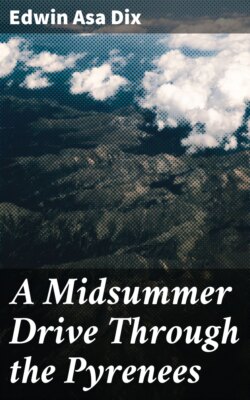Читать книгу A Midsummer Drive Through the Pyrenees - Edwin Asa Dix - Страница 8
На сайте Литреса книга снята с продажи.
II.
ОглавлениеFacts of detail prove farther to seek. We inquire almost in vain for travelers' notes on the Pyrenees. Those who had written on Spanish travel spoke of the range admiringly. But these authors, we find, invariably, only passed by the eastern extremity, or the western, of the great mountain wall; the mountains themselves they did not visit. Search in the large libraries brings out a few scant volumes of Pyrenean travel, but all, with two or three exceptions, bear date within the first three-fifths of the century. It is with books, often, as with the Furançon, the wine of the Pyrenees, and with certain other vintages: age improves them only up to a certain limit; when put away longer than a generation, they lose value.
Taine's glowing Tour,[1] itself made nearly thirty years ago, is a delight, almost a marvel; the style, the torrent of simile, the vivid thought, rank it as a classic. But M. Taine's is less a book of travel than a work of art; in the iridescence of the descriptions, you lose the reflection of the things described. Even hand-books, the way-clearing lictors of travel, prove, as to the Pyrenees region, first scarce and then scanty. The few we unearth in the stores are armed only with the usual perfunctory fasces of facts—cording information into stiff, labeled bunches, marshaling details into cramped and characterless order, scrutinizing the ground with a microscope, never surveying it in bird's-eye view. Two recent novels we eagerly buy, hearing that their scenes are laid in that vicinity; but each merely speaks, in easy omniscience, of the "distant chain of blue mountains," or of the "far-off snow-peaks outlined against the horizon," and the fiction proves hardly worth sifting for so little fact. Plainly the Pyrenees lack the voluminous literature of the Alps. Plainly we shall have, in part, to grope our way. The grooves of Anglo-Saxon travel are many and deep, lined increasingly with English speech and customs; but they have not yet been cut into these Spanish mountains.
The search enlarges the horizon, however. The lonely roads we learn to qualify in thought with occasional branches of railway; the dangerous trails, with certain cultivated highways; the dismal road-side inns, with spasmodic hotels, some even named confidently as "palatial." We read of spas and springs and French society, more than of chasms and banditti. We realize in surprise that over all the past of these mountains flows now in bracing contrast the easy, laughing tide of modern French fashion—life so different in detail, so like in kind, to the day of trapping and tourney.
It is enough:
"Now are we fix'd, and now we will depart,
Never to come again till what we seek
Be found."
